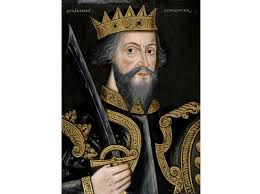...english people have surnames because of people called william (kind of)You can tell a lot about family history from a surname. For instance, being a Smith, one of my ancestors would have been a metalworker. This is an example of a ‘trade’ surname and there are many out there; thatchers, fletchers, butchers, bakers and the like. But where did the practice of giving people surnames come from? Surnames came out of a need to differentiate between individuals with the same given name. You might think that therefore they have been around as long as people have. However, we can actually trace this phenomenon back to the late middle ages and the centuries following the Norman Conquest. In Anglo-Saxon England there was a great variation of personal names, and this variation meant it was not too hard to differentiate; there was most likely only one Athelstan or Wulfric in your village. After the Norman Conquest however, there was an increasing homogeneity to the names that people used. With the influx of Norman aristocracy some names such as Robert, Elizabeth, Mary and Thomas, became associated with a higher social standing, and seem to have been chosen by those who desired their children to be upwardly mobile. In the early 13th century in Lincolnshire, records show 15% of people called William. This trend towards similar names accelerated; when assessing the people in order to charge them the poll tax in 1379, the returns for Sheffield showed that 33% of people were called John and another 19% were named William. Yes, that’s right, over half of people carried one of these two names meaning you would meet a constant stream of Williams and require a means of distinguishing. Such a lack of variation was clearly the main causal factor in the need to add a second name for identification. Yet the concurrent growth in taxation bureaucracy and the requirement to know which William had paid his taxes and which had not, acted as an important catalyst. Steady population growth until the mid 14th century probably played a background role too. Initially, these extra names were descriptive of the individual and often changed during the course of your life. If you changed your job or where you lived, so your epithet could too. William Townsend (who lived on the edge of town) might become William Walton (his village of origin) if he were to move to a town for example. Over time these names stuck and by 1400 most people seem to have names that passed down through the generations as most still do today.
0 Comments
Leave a Reply. |
Categories
All
Archives
April 2024
|

 RSS Feed
RSS Feed